Successful cases of Japanese companies utilizing Vietnamese factories
Successful cases of Japanese companies utilizing Vietnam factory solutions
Have you ever wondered why so many Japanese companies are turning to Vietnam for their manufacturing needs? The answer lies in the growing number of successful cases of Japanese companies utilizing Vietnam factory networks, especially through partnerships with providers. In this article, we will walk you through the benefits of Vietnam–Japan collaboration in factory development, from competitive costs and trade advantages to a skilled young workforce. You’ll also discover real examples of Japanese brands thriving with Vietnamese manufacturing support.
Vietnam–Japan Collaboration in Factory Development

Collaboration between Vietnam and Japan (Source)
Vietnam and Japan have forged a robust partnership in factory development, driven by mutual economic interests and strategic alignment. This collaboration has attracted numerous Japanese companies seeking to diversify their manufacturing bases and capitalize on Vietnam's favorable business environment.
The Japanese government has actively supported this shift. In 2020, it facilitated the relocation of 15 companies to Vietnam to strengthen supply chains and reduce dependence on a single market. This initiative underscores Japan's commitment to deepening industrial ties with Vietnam.
Several factors contribute to Vietnam's appeal:
- Competitive Production Costs: Vietnam offers lower labor and operational costs compared to neighboring countries, enhancing profitability for manufacturers.
- Favorable Trade Agreements: Vietnam's participation in multiple free trade agreements facilitates easier access to global markets for Japanese companies.
- Young and Dynamic Workforce: With a median age of around 30, Vietnam's labor force is youthful and adaptable, meeting the demands of modern manufacturing.
These factors have enticed major Japanese firms like Olympus, Nintendo, and Sharp to establish manufacturing operations in the country. For instance, Sharp's new factory in Ho Chi Minh City focuses on producing car displays and air purifiers, leveraging Vietnam's growing electronics sector.
Beyond traditional manufacturing, Vietnam and Japan are collaborating in high-tech industries. A key focus is developing the semiconductor industry to enhance supply chain stability and spark innovation. Initiatives include establishing co-innovation spaces and training programs to develop a skilled semiconductor workforce.
Why Japanese Companies Should Choose Factories in Vietnam
Vietnam has become an attractive destination for Japanese companies seeking to expand their manufacturing operations. This appeal stems from competitive production costs, favorable trade agreements, and a young, dynamic workforce.
Competitive Production Costs

Competitive production costs (Source)
Vietnam offers significantly lower manufacturing costs compared to other regional players. The average monthly manufacturing wage in Vietnam stands at approximately $261, which is lower than in neighboring countries like Thailand and the Philippines. Thanks to lower costs, Japanese firms can stay profitable without compromising on product quality.
Beyond affordable labor, Vietnam stands out for its cost-effective operational environment. As an illustration, monthly manufacturing expenses are substantially lower than Thailand’s $142,344 or Singapore’s $366,561. The cost reductions open up opportunities for companies to pursue growth and develop new ideas. This makes it possible for companies to focus more resources on growing their business and driving innovation.
Benefits from Trade Agreements

Benefits from trade agreements (Source)
Vietnam has established several free trade agreements (FTAs) that provide Japanese companies with preferential access to various markets. Notably, the Vietnam–Japan Economic Partnership Agreement (VJEPA), effective since October 2009, facilitates trade in goods and services, investment, and the movement of natural persons between the two countries.
Additionally, Vietnam is a member of the Comprehensive and Progressive Agreement for Trans-Pacific Partnership (CPTPP), which includes Japan and other major economies. This agreement reduces tariffs and promotes trade liberalization among member countries, offering Japanese companies operating in Vietnam broader market access and reduced trade barriers.
These trade agreements enhance Vietnam's attractiveness as a manufacturing base for Japanese companies, enabling them to benefit from reduced tariffs, streamlined customs procedures, and expanded market opportunities.
Young and Dynamic Workforce

Young and dynamic workforce (Source)
Vietnam's workforce is characterized by its youth and dynamism. With a median age of around 32 years, the labor force is energetic and adaptable. This demographic advantage ensures a steady supply of workers eager to learn and grow within various industries.
The Vietnamese government has invested in education and vocational training, resulting in a skilled workforce proficient in sectors like electronics, textiles, and manufacturing. This emphasis on skill development aligns with the needs of Japanese companies seeking quality and precision in production.
Moreover, the cultural compatibility between Vietnam and Japan fosters effective collaboration. Shared values such as diligence, respect, and commitment to quality create a harmonious working environment, enhancing productivity and mutual understanding.
Some successful cases of Japanese companies utilizing factories in Vietnam through Kizuna
Kizuna is recognized as a reliable partner for Japanese businesses aiming for stable and efficient Vietnam factory operations. With its ready-built factory model, strong support services, and business-friendly environment, Kizuna has helped many Japanese companies succeed in the Vietnamese market. Below are five standout examples that highlight this successful collaboration.
#1. Yamazaki
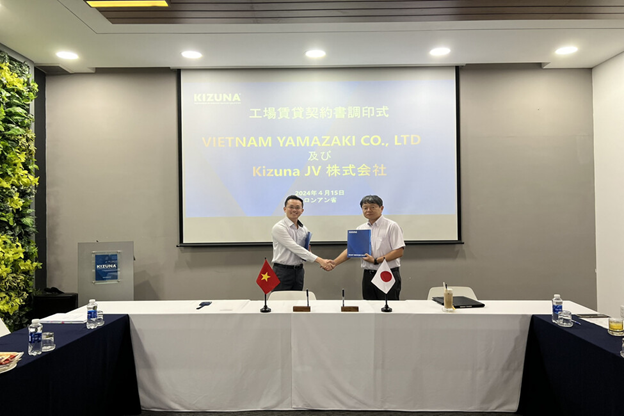
Yamazaki (Source)
Yamazaki, a Japanese food processing company, chose Kizuna for its strategic location and robust infrastructure. In just four years, the company achieved impressive growth and decided to expand operations at Kizuna. The choice to remain and grow in the same industrial park reflects Yamazaki’s confidence in Kizuna’s support system and long-term reliability.
One key reason for Yamazaki’s success lies in Kizuna’s consistent utility services and streamlined administrative support. The company benefited from smooth production thanks to reliable electricity and water supply, as well as assistance with regulatory procedures. These services reduced downtime and allowed Yamazaki to focus on scaling its core business.
Moreover, Kizuna’s clean and secure working environment helps Yamazaki maintain high hygiene standards, which are critical in the food manufacturing industry. The well-planned layout of the industrial park supports logistics efficiency, which further enhances product distribution speed and quality.
Yamazaki’s story showcases how Kizuna provides a growth-oriented foundation for Japanese manufacturers seeking long-term stability and operational efficiency in Vietnam.
#2. Amphenol
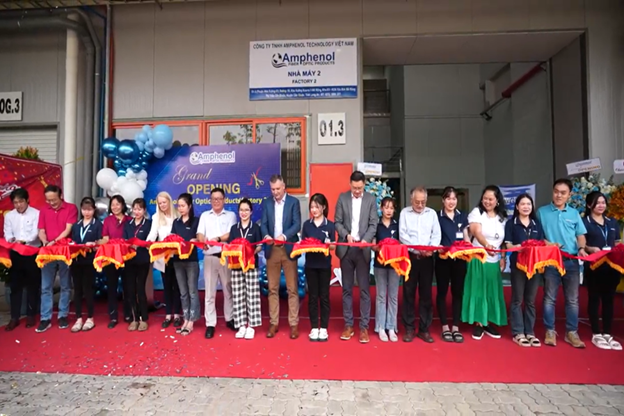
Amphenol (Source)
Amphenol, a global leader in electrical connectors and cable systems, selected Kizuna to set up its Vietnam production facility. The company praised Kizuna for providing a seamless experience in launching its operations, from initial setup to full-scale production.
The ready-built factory spaces offered by Kizuna allowed Amphenol to speed up its timeline and start manufacturing with minimal delay. Beyond physical infrastructure, Kizuna also delivered dedicated support through multilingual staff who assisted with legal documentation, licenses, and HR management.
Amphenol highlighted Kizuna’s reliable logistics system and well-managed security as major factors in maintaining high production quality. With supply chains often affected by unpredictable events, such consistency gives international companies like Amphenol a crucial edge in meeting global demand.
By choosing Kizuna, Amphenol secured not only a location for production but also a business partner committed to operational excellence. The company’s Vietnam success story underlines how Kizuna's ecosystem directly contributes to efficient expansion and manufacturing success.
#3. ACE Bongsan Vina
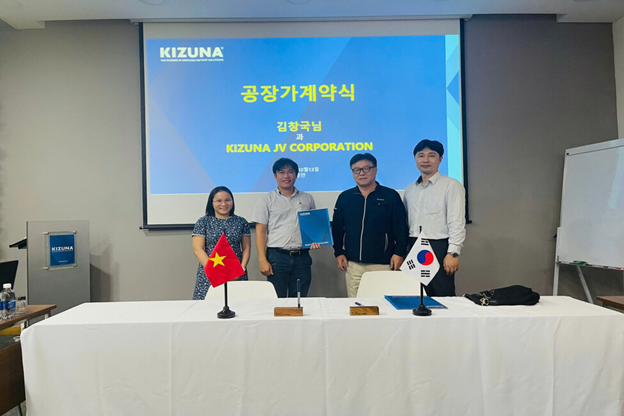
ACE Bongsan Vina (Source)
ACE Bongsan Vina faced a tough period during the COVID-19 pandemic, but the company bounced back stronger—thanks in part to the support from Kizuna’s JV factory model. This South Korean-Japanese joint venture experienced uninterrupted service and production flexibility even during lockdowns.
Kizuna played a central role in helping ACE Bongsan navigate supply chain disruptions and labor shortages. Its rapid response services and clear communication channels helped the company maintain stability when many others faced downtime.
The flexibility of the factory layout allowed ACE Bongsan to reorganize its operations based on changing market demands. This adaptability gave the company a strong comeback edge as global markets recovered.
Choosing Kizuna also meant streamlined health and safety compliance during a critical time. With professionally managed facilities and support for digital processes, ACE Bongsan stayed resilient and resumed full-scale production quickly.
This success story reflects Kizuna’s ability to not only support growth but also ensure resilience through challenging global events.
#4. Yanase
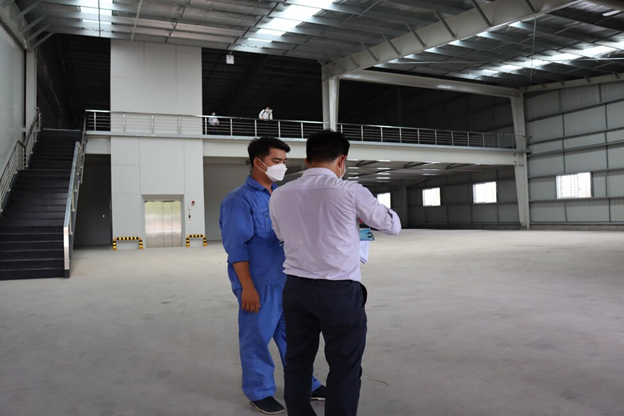
Yanase (Source)
Yanase, a company specializing in precision machinery parts, recently became a new member of the Kizuna community. Attracted by Kizuna’s transparent leasing process and high-standard facilities, Yanase moved quickly to begin operations in Vietnam.
The decision to join Kizuna was influenced by its one-stop service model, which simplifies everything from company registration to labor recruitment. This model allows new investors to focus on product development and market strategy instead of navigating administrative hurdles.
Yanase also appreciated the quality of factory design. Kizuna’s modern infrastructure supports energy efficiency and environmental standards, which aligns with Yanase’s commitment to sustainable practices.
Kizuna’s continuous business support and technical consulting gave Yanase a strong starting point. From setting up production lines to organizing supply chains, Kizuna’s integrated approach reduced entry barriers and created ideal conditions for growth.
Yanase’s early success illustrates how Kizuna provides a solid launchpad for Japanese SMEs aiming to expand in Southeast Asia.
#5. Precision Fukuhara
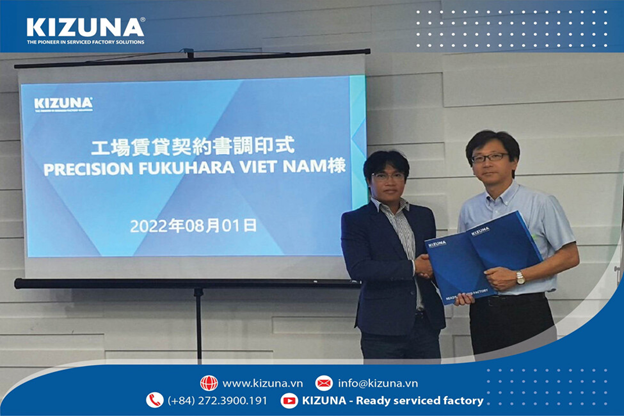
Precision Fukuhara (Source)
Precision Fukuhara, a leading name in knitting machinery, chose Kizuna to establish a new chapter in its international operations. The company focuses on innovation and quality—two areas that align well with Kizuna’s premium ready-built factories.
The factory handover to Fukuhara marked a milestone that reinforced trust in Kizuna’s efficient project management. Timely delivery, transparent agreements, and ongoing support ensured that Fukuhara could move forward without delays.
Fukuhara was impressed by Kizuna’s on-site support team, which helps with customs, environmental procedures, and local partnerships. These services reduce setup friction and accelerate operational readiness.
Another highlight was the technical compatibility of the facilities. Fukuhara’s machines require high-precision environments, and Kizuna’s factories meet those strict demands in layout, ventilation, and structural design.
By partnering with Kizuna, Fukuhara strengthened its global production capacity and secured a competitive base in Vietnam’s growing textile sector.